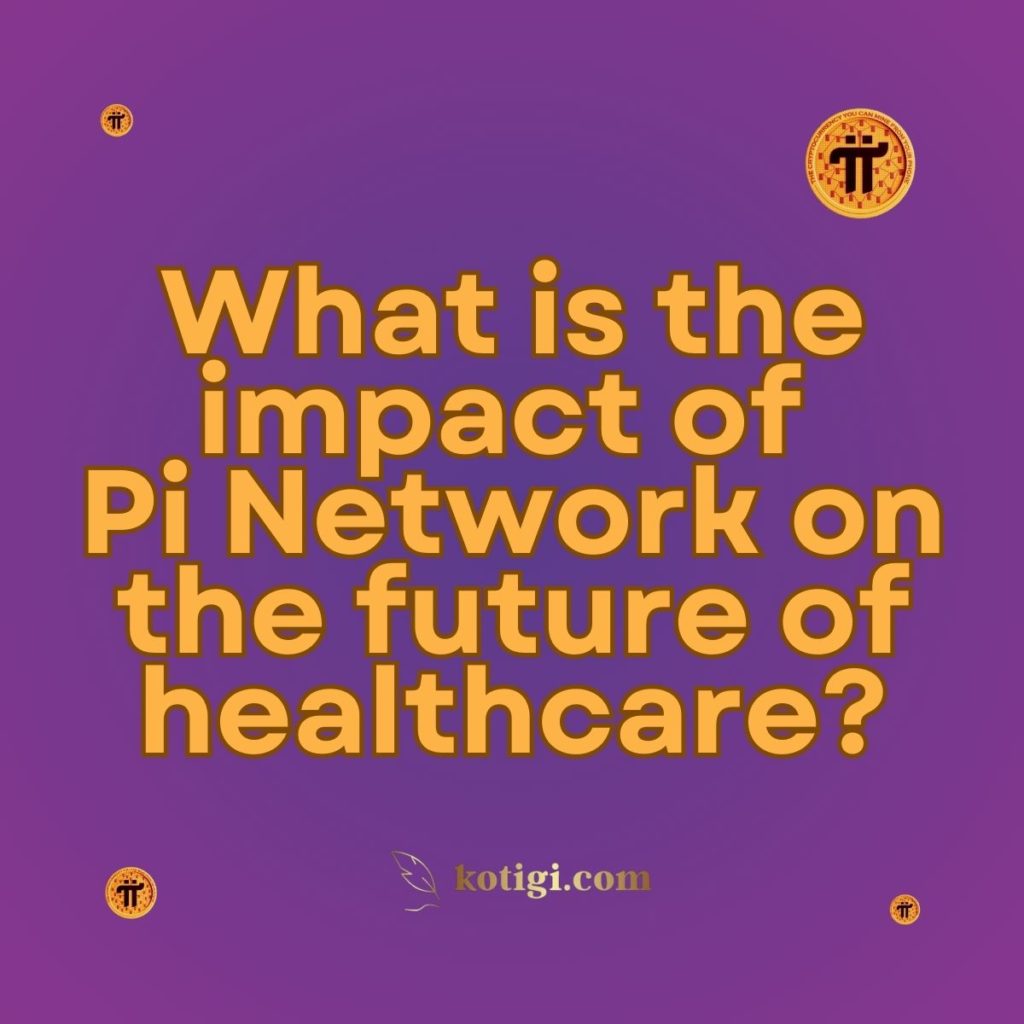
What is the impact of Pi Network on the future of healthcare?
Pi Network is poised to transform the future of healthcare by enhancing patient data management, improving access to medical resources, fostering telemedicine, encouraging collaboration among healthcare professionals, and promoting health-focused blockchain applications. This article explores the various ways Pi Network is shaping the healthcare landscape and empowering patients and providers in the digital age.
Introduction
As the healthcare sector continues to evolve, driven by technological advancements and the increasing need for efficient, patient-centered solutions, Pi Network emerges as a significant player in this transformation. Launched in 2019, Pi Network offers a unique cryptocurrency mining experience through mobile devices, allowing users to earn digital currency with minimal resource investment. The implications of this decentralized platform extend beyond finance; they reach into the very fabric of healthcare delivery, data management, and patient engagement. In this article, we will explore how Pi Network influences the future of healthcare by enhancing patient data management, improving access to medical resources, fostering telemedicine, encouraging collaboration among healthcare professionals, and promoting innovative health-focused applications.
Enhancing Patient Data Management
One of the critical areas where Pi Network can impact healthcare is in enhancing patient data management.
Secure Data Storage
Pi Network’s underlying blockchain technology provides a secure and immutable framework for storing patient data. By utilizing decentralized storage, healthcare providers can ensure that sensitive patient information is protected from unauthorized access and tampering. This security is paramount in healthcare, where data breaches can have severe consequences for patients and providers alike.
Improved Data Interoperability
The integration of blockchain technology within the Pi Network can facilitate better interoperability among different healthcare systems. By creating standardized protocols for data sharing, healthcare providers can access patient information from various sources seamlessly. This interoperability ensures that medical professionals have comprehensive views of patients’ health histories, leading to better-informed clinical decisions and improved patient outcomes.
Enhanced Patient Control Over Data
With Pi Network, patients can have more control over their own medical data. Through blockchain, patients can grant or revoke access to their medical records at will, ensuring that only authorized healthcare providers can view their information. This level of control empowers patients to take an active role in their healthcare, fostering trust and transparency in the patient-provider relationship.
Improving Access to Medical Resources
Pi Network has the potential to improve access to medical resources, especially for underserved populations.
Cost Reduction in Healthcare Services
The use of Pi Network and its cryptocurrency can help reduce the costs associated with healthcare services. By allowing patients to pay for medical treatments and consultations with Pi coins, healthcare providers can minimize transaction fees typically associated with credit cards and other payment methods. This reduction in costs can lead to lower prices for patients and improved access to essential healthcare services.
Telemedicine Opportunities
The rise of telemedicine has transformed how healthcare is delivered, and Pi Network can play a role in enhancing these services. By utilizing the cryptocurrency for payments, patients can access telehealth consultations without the burden of high transaction fees. This accessibility can benefit individuals in remote areas or those with limited mobility, enabling them to receive medical care conveniently from their homes.
Funding for Health Initiatives
As Pi Network grows, healthcare initiatives can leverage cryptocurrency for funding purposes. Nonprofit organizations, community health programs, and innovative healthcare startups may explore Pi as a means to raise funds for their projects. This funding can support initiatives aimed at improving health outcomes, particularly in underserved communities.
Fostering Telemedicine
Pi Network’s impact on telemedicine can significantly enhance patient access to healthcare services.
Increased Engagement in Telehealth
The integration of Pi Network into telemedicine platforms can increase patient engagement in virtual consultations. With the ability to pay for services using Pi coins, patients may be more likely to utilize telehealth options rather than forgoing care due to financial barriers. This increased engagement can lead to better health outcomes through timely access to healthcare providers.
Expanding Access to Specialists
Telemedicine allows patients to connect with specialists regardless of their geographical location. By utilizing Pi Network, patients can access specialized care without the added costs of travel. This accessibility broadens the scope of healthcare available to patients, ensuring they receive the necessary expertise without unnecessary delays or expenses.
Promoting Continuous Monitoring
With telemedicine services integrated with Pi Network, healthcare providers can facilitate continuous monitoring of patients with chronic conditions. Through digital tools, patients can regularly update their health data, and providers can track their progress over time. This proactive approach can lead to more effective management of chronic illnesses and improved patient quality of life.
Encouraging Collaboration Among Healthcare Professionals
Pi Network fosters a collaborative environment for healthcare professionals to share knowledge and resources.
Interdisciplinary Collaboration
The decentralized nature of Pi Network encourages interdisciplinary collaboration among healthcare professionals. Physicians, nurses, and specialists can engage with one another through shared platforms, discussing patient cases and best practices. This collaboration enhances the quality of care and fosters a culture of continuous learning within the healthcare community.
Knowledge Sharing and Research Collaboration
As healthcare providers engage with Pi Network, they can easily share research findings and innovative practices. This collaboration can lead to advancements in medical knowledge and improved patient care protocols. By fostering an environment where professionals can share insights and learn from one another, Pi Network contributes to the advancement of healthcare as a whole.
Access to Global Expertise
Pi Network’s global reach allows healthcare professionals from different regions to connect and collaborate. This access to diverse expertise can lead to innovative solutions to complex healthcare challenges. By leveraging the knowledge of professionals worldwide, the healthcare sector can address issues more effectively and enhance patient care.
Promoting Health-Focused Blockchain Applications
The integration of Pi Network encourages the development of health-focused applications that can transform healthcare delivery.
Health Tracking and Management Apps
With the potential for decentralized applications (dApps) on the Pi Network, developers can create health tracking and management apps that empower patients to monitor their health. These applications can include features such as medication reminders, fitness tracking, and nutrition guidance. By providing users with tools to manage their health, these apps promote proactive engagement in personal wellness.
Blockchain-Based Medical Records
The use of blockchain technology in healthcare can revolutionize medical record management. Pi Network provides an infrastructure for developers to create blockchain-based systems that securely store and share patient records. This innovation can enhance efficiency, reduce errors, and improve patient care by ensuring that medical professionals have access to accurate and up-to-date information.
Gamification of Health Initiatives
Developers can leverage the Pi Network to create gamified health initiatives that encourage healthy behaviors. By incorporating elements of competition, rewards, and community support, these initiatives can motivate individuals to engage in healthier lifestyles. This approach not only improves individual health but also fosters a sense of community around wellness.
Conclusion
The impact of Pi Network on the future of healthcare is profound, encompassing enhanced patient data management, improved access to medical resources, the promotion of telemedicine, collaboration among healthcare professionals, and the development of innovative health-focused applications. By leveraging blockchain technology and cryptocurrency, Pi Network empowers patients and providers alike, fostering a more transparent, efficient, and patient-centered healthcare system.
As the network continues to grow, its influence on healthcare delivery and community engagement is likely to expand, paving the way for a more equitable and accessible healthcare landscape. By prioritizing collaboration, security, and innovation, Pi Network is shaping the future of healthcare, enabling individuals to thrive in an increasingly digital world.
Key Takeaways
- Enhanced Patient Data Management: Pi Network leverages blockchain technology to provide secure, interoperable, and patient-controlled data management.
- Improved Access to Medical Resources: The use of Pi coins can reduce costs, promote telemedicine, and provide funding for health initiatives.
- Fostering Telemedicine: Pi Network enhances patient engagement in telehealth services, expanding access to specialists and facilitating continuous monitoring.
- Encouraging Collaboration: The decentralized nature of Pi Network promotes interdisciplinary collaboration and knowledge sharing among healthcare professionals.
- Innovative Health Applications: Pi Network encourages the development of health tracking apps, blockchain-based medical records, and gamified health initiatives that empower individuals in their healthcare journeys.





